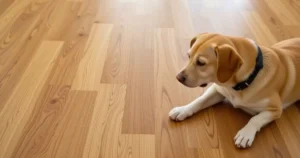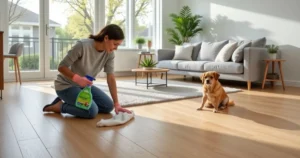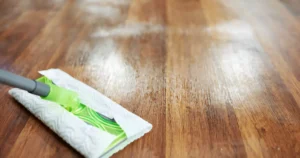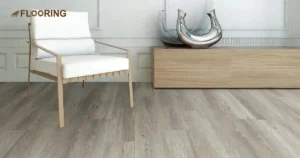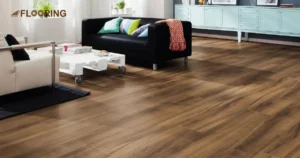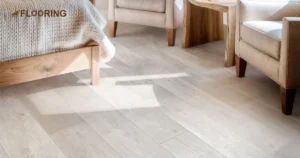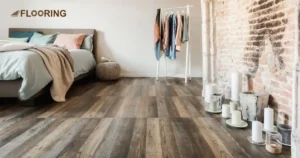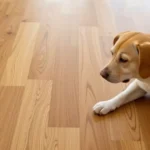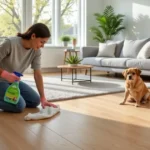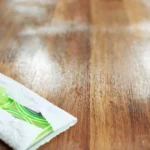Homemade linoleum floor cleaners offer a practical alternative to expensive commercial products. These DIY solutions use common household ingredients to effectively clean and maintain your floors. By making your own cleaners, you can save money and avoid harsh chemicals.
Table of Contents
Creating your homemade linoleum floor cleaners is easier than you might think. With just a few common household items, you can whip up effective cleaning solutions in minutes. These homemade cleaners not only save money but also reduce plastic waste.
Let’s explore the world of DIY linoleum floor cleaning and discover how to make your floors shine naturally.
Key Takeaways
- Homemade linoleum floor cleaners are cost-effective alternatives to commercial products.
- DIY linoleum cleaners use common household ingredients like vinegar, baking soda, and castile soap.
- Making your own linoleum floor cleaners reduces plastic waste and exposure to harsh chemicals.
- Regular use of homemade cleaners can effectively maintain and prolong the life of linoleum floors.
- Always test homemade linoleum floor cleaners on a small area before applying them to the entire floor.
Benefits of Homemade Linoleum Floor Cleaners
Homemade linoleum floor cleaners offer numerous advantages over commercial products. These homemade solutions provide an effective way to clean a linoleum floor without harsh chemicals along with the following benefits.
- Cost-effective: Homemade linoleum floor cleaners use inexpensive household ingredients, saving you money in the long run.
- Eco-friendly: DIY cleaners reduce plastic waste and often use natural, biodegradable ingredients.
- Customizable: You can adjust the strength and scent of homemade linoleum floor cleaners to suit your preferences.
- Non-toxic: Many homemade cleaners are free from harsh chemicals, making them safer for children and pets.
- Effective cleaning: DIY solutions can be just as powerful as commercial products when used correctly.
Top Homemade Linoleum Floor Cleaners
There are several effective homemade linoleum floor cleaners you can easily make at home. These DIY solutions use common household ingredients and can be customized to suit your specific cleaning needs.

Vinegar-Based Homemade Linoleum Floor Cleaner
Vinegar is a versatile and effective cleaning agent for linoleum floors. Its acidic nature helps break down dirt and grime without damaging the floor’s surface. To make a vinegar-based cleaner, mix equal parts white vinegar and warm water in a spray bottle. For extra cleaning power, add a few drops of liquid dish soap to the solution.
Baking Soda Solution for Linoleum Floors
Baking soda is an excellent natural abrasive that can help remove tough stains from linoleum floors. Create a paste by mixing baking soda with a small amount of water. Apply this paste to stubborn stains and let it sit for a few minutes before scrubbing gently with a soft brush. Rinse thoroughly with clean water to remove any residue.
Castile Soap Linoleum Floor Cleaner Recipe
Castile soap is a gentle yet effective cleaner for linoleum floors. Mix one tablespoon of liquid castile soap with one gallon of warm water. This solution is perfect for regular cleaning and leaves a pleasant, natural scent. For tougher stains, add a quarter cup of white vinegar to the mixture for extra cleaning power.
Lemon Juice and Olive Oil Polish
For a natural shine, combine equal parts lemon juice and olive oil. This homemade linoleum floor cleaner not only cleans but also polishes your floors. Apply a small amount to a soft cloth and gently buff the linoleum surface. The lemon juice cuts through grime while the olive oil leaves a protective, glossy finish.
Essential Oil Disinfectant Cleaner
Create a naturally disinfecting homemade linoleum floor cleaner by adding essential oils to your cleaning solution. Mix 10-15 drops of tea tree, eucalyptus, or lavender oil with a gallon of warm water and a quarter cup of white vinegar. This solution cleans, disinfects, and leaves a fresh scent without harsh chemicals.
How to Make Homemade Linoleum Floor Cleaners
Creating your own linoleum floor cleaners is a simple process that requires just a few steps. Follow this guide to make an effective homemade cleaner for your linoleum floors.
Step 1: Gather the necessary ingredients and tools. You’ll need a large bucket, measuring cups, and a stirring utensil.
Step 2: Fill the bucket with 1 gallon of warm water. Ensure the water is not too hot to avoid damaging the linoleum.
Step 3: Add 1/4 cup of your chosen cleaning agent (vinegar, castile soap, or baking soda) to the water.
Step 4: If using essential oils for fragrance or disinfecting properties, add 10-15 drops to the mixture.
Step 5: Stir the solution gently to combine all ingredients thoroughly.
Step 6: Test the cleaner on a small, inconspicuous area of your linoleum floor before full application.
Step 7: Once tested, your homemade linoleum floor cleaner is ready for use.
Applying Homemade Cleaners to Linoleum Floors
Proper application of homemade cleaners is crucial for effective linoleum floor cleaning. Unlike laminate flooring layout patterns that may affect cleaning techniques, linoleum floors generally require uniform cleaning regardless of their pattern. Follow these tips to ensure the best results when using your DIY cleaning solutions.

- Preparation: Sweep or vacuum the floor to remove loose dirt and debris before applying the cleaner.
- Application method: Use a spray bottle for spot cleaning or a mop for larger areas.
- Dilution: Ensure the homemade linoleum floor cleaner is properly diluted to avoid damage to the floor.
- Gentle cleaning: Use soft mops or cloths to avoid scratching the linoleum surface.
- Rinsing: Always rinse the floor with clean water after applying homemade cleaners to remove any residue.
- Drying: Use a clean, dry cloth or mop to remove excess moisture and prevent water damage.
Safety Tips for Homemade Linoleum Cleaners
While homemade linoleum floor cleaners are generally safe, it’s important to take precautions when using and storing them. Always label your DIY cleaning solutions clearly and keep them out of reach of children and pets.
Ingredients to Avoid on Linoleum Floors
Some ingredients can damage linoleum floors and should be avoided in homemade cleaners. Be cautious when selecting components for your DIY solutions.
- Harsh abrasives: Avoid steel wool or scouring powders that can scratch the linoleum surface.
- Ammonia: This strong chemical can strip the protective coating from linoleum floors.
- Solvent-based cleaners: These can dissolve the linoleum material and cause permanent damage.
- Excessive water: Too much moisture can seep under the linoleum and cause lifting or bubbling.
Testing Homemade Cleaners on Linoleum
Before applying a new homemade linoleum floor cleaner to the entire floor, it’s crucial to test it on a small, inconspicuous area. This helps ensure the cleaner won’t cause any adverse reactions.
- Choose a test spot: Select a hidden area, such as under furniture or in a corner.
- Apply the cleaner: Use a small amount of the homemade solution on the test area.
- Wait and observe: Allow the cleaner to sit for a few minutes, then check for any discoloration or damage.
- Rinse and dry: Clean the test area thoroughly and let it dry completely.
- Final check: Examine the area after 24 hours to ensure no delayed reactions occur.
Comparing Homemade vs. Commercial Cleaners
Homemade linoleum floor cleaners offer several advantages over commercial products. While regular maintenance is crucial, occasionally you may need to deep clean linoleum floors. Homemade cleaners can be equally effective for this task when used properly. Here’s a comparison of key factors to consider when choosing between DIY and store-bought solutions:

| Factor | Homemade Cleaners | Commercial Cleaners |
| Cost | Generally more affordable, using inexpensive household ingredients | Often more expensive, especially for specialized products |
| Customization | Easily adjustable to suit specific cleaning needs and preferences | Limited options, pre-formulated solutions |
| Environmental Impact | Typically more eco-friendly, using natural ingredients and reducing plastic waste | It may contain harsh chemicals and contribute to plastic pollution |
| Effectiveness | It can be highly effective when properly formulated and applied | Designed for specific cleaning tasks, but may contain unnecessary additives |
| Safety | Often non-toxic and safer for households with children and pets | It may contain harsh chemicals that require careful handling and storage |
| Convenience | Requires preparation time but ingredients are usually readily available | Ready to use out of the bottle, but may require special trips to the store |
Closing Remarks
Homemade linoleum floor cleaners offer a practical and eco-friendly approach to maintaining your floors. These DIY solutions provide effective cleaning power while being gentle on your linoleum surfaces.
By using simple ingredients from your kitchen, you can create safe and affordable cleaners that rival commercial products. Embracing homemade linoleum floor cleaners not only saves money but also reduces your environmental impact.
With the recipes and tips provided, you can easily incorporate these DIY cleaners into your regular floor maintenance routine. Remember to always test new solutions on a small area first and enjoy the benefits of clean, well-maintained linoleum floors using your own homemade cleaners.
Frequently Asked Questions
Can I use essential oils in my homemade linoleum floor cleaners?
Yes, you can add essential oils to homemade linoleum floor cleaners. Use 10-15 drops per gallon of cleaner for fragrance and mild antibacterial properties. Lavender, lemon, and tea tree oils work well with DIY linoleum cleaners.
How often should I use homemade linoleum floor cleaners?
Use homemade linoleum floor cleaners once a week for general maintenance. For high-traffic areas, you may need to clean twice a week. Adjust the frequency based on your floor’s condition and use.
Can I make a large batch of homemade linoleum floor cleaner and store it?
It’s best to make homemade linoleum floor cleaners in small batches. Fresh solutions are more effective. If you make extra, store it in a sealed container for up to a week in a cool, dark place.
Are homemade linoleum floor cleaners safe for pets?
Most homemade linoleum floor cleaners are pet-safe when used correctly. Avoid essential oils toxic to pets, like tea tree oil. Rinse floors thoroughly after cleaning to remove any residue that pets might lick.
Can I use homemade linoleum floor cleaners on other types of flooring?
Some homemade linoleum floor cleaners may work on other surfaces. However, always test on a small area first. Different flooring materials require specific care, so research before using DIY cleaners on non-linoleum floors.
How can I remove stubborn stains with homemade linoleum floor cleaners?
For tough stains, make a paste with baking soda and water. Apply it to the stain, let it sit for 5-10 minutes, then gently scrub. Rinse with your regular homemade linoleum floor cleaner.
Can I use hot water with my homemade linoleum floor cleaners?
Use warm, not hot, water when making homemade linoleum floor cleaners. Hot water can damage linoleum flooring. Stick to lukewarm water for the best results and to protect your floors.

